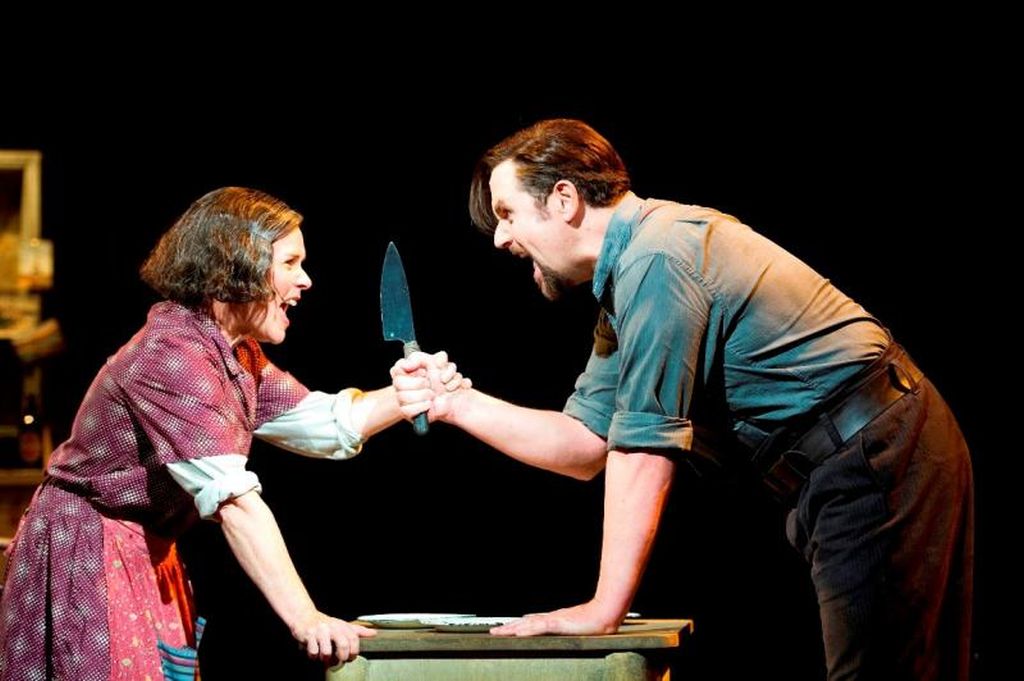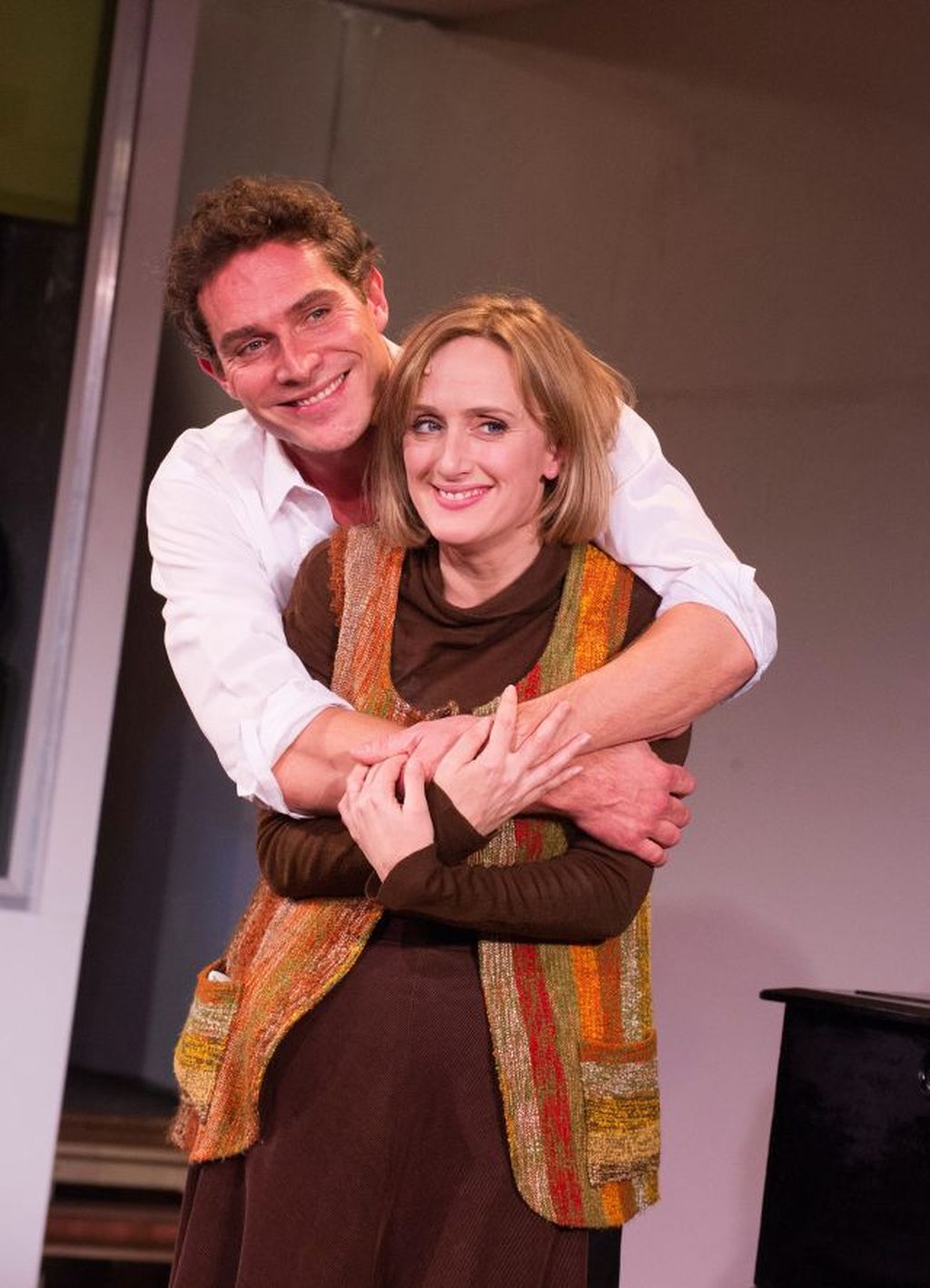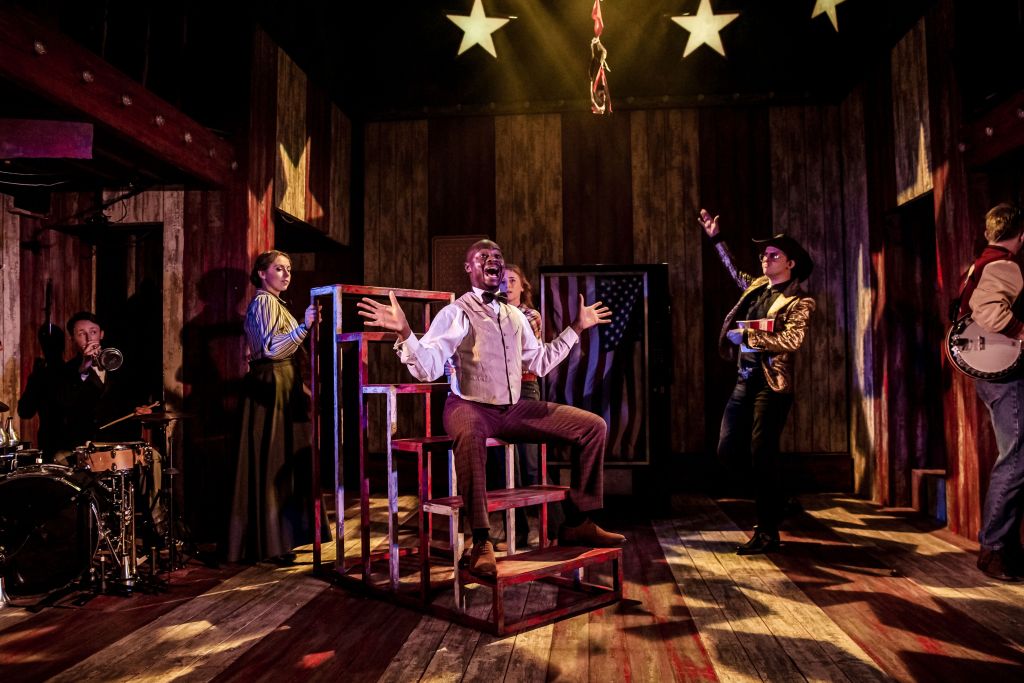Sondheim at 90: adults will listen | reviews, news & interviews
Sondheim at 90: adults will listen
Sondheim at 90: adults will listen
The composer-lyricist has left an indelible legacy

Here's an irony worthy of the work of Stephen Sondheim, an artist who clearly knows a thing or two about the multiple manifestations of that word.
So even as one actual birthday is being properly feted, another belonging to the world of the stage is not. Life and art abound in contradiction, as very few creators within or outside the world of musical theatre have reminded us as consistently, and brilliantly, as the composer-lyricist who, on the occasion of the 2010 Broadway revue Sondheim on Sondheim, deliciously penned a song in his own honour entitled "God". One can only assume from whatever degree of isolation he may be spending today that Sondheim is well aware of the multitudes for whom that song title isn't affectionately self-mocking but comes very close to the truth, not least for the more secular amongst us.
 My own acquaintanceship with his work came during my first year at university in the States, which coincided with the 1979 Broadway opening of Sweeney Todd. An easy train ride away from New Haven, Hal Prince's historic production became a theatrical magnet for me and various like-minded friends who developed an immediate fascination with this extraordinary story of a vengeful barber-turned-cannibal, Sweeney, and his entirely unlikely alliance with a smitten baker, Mrs Lovett, who is more than willing to sacrifice morality on the (often quite mirthful) altar of affection. I saw Angela Lansbury and Len Cariou give their iconic performances and returned on numerous occasions to the Uris Theatre (now the Gershwin) so as to sneak in at the interval – ah, those were the days! – thirsting for a cultural top-up. (Pictured above: Imelda Staunton and Michael Ball in Sweeney Todd, this photo and below right c. Tristram Kenton)
My own acquaintanceship with his work came during my first year at university in the States, which coincided with the 1979 Broadway opening of Sweeney Todd. An easy train ride away from New Haven, Hal Prince's historic production became a theatrical magnet for me and various like-minded friends who developed an immediate fascination with this extraordinary story of a vengeful barber-turned-cannibal, Sweeney, and his entirely unlikely alliance with a smitten baker, Mrs Lovett, who is more than willing to sacrifice morality on the (often quite mirthful) altar of affection. I saw Angela Lansbury and Len Cariou give their iconic performances and returned on numerous occasions to the Uris Theatre (now the Gershwin) so as to sneak in at the interval – ah, those were the days! – thirsting for a cultural top-up. (Pictured above: Imelda Staunton and Michael Ball in Sweeney Todd, this photo and below right c. Tristram Kenton)
Across the run, I watched as the original leads deepened their connection to parts that define them to this day, going on to catch various replacements (Dorothy Loudon and George Hearn preeminently) plumb depths of their own within an experience to which there had been no musical equivalent in my theatre education to that point. Having been weaned on Broadway revivals of On the Town and The Pajama Game, I was as unprepared for the power of Sweeney Todd as I then became fascinated, even overwhelmed, by it. And still am.
 My parents had the cast albums to the earlier collaborations between Sondheim and Prince – Company, Follies, A Little Night Music, Pacific Overtures – which collectively amounted to a decade-long volume of output during the 1970s that won't be equaled again: the mechanics of modern-day production, not to mention financial exigency, work against that kind of history repeating itself, even if younger equivalents to the Sondheim-Prince pairing were there to be found. Another irony worth noting, I suppose, is that the only Sondheim-Prince show I was aware of from its actual inception was also their only Broadway flop: Merrily We Roll Along, which I followed from first announcement through to its closing Saturday matinee for the simple reason that I had a lifelong friend in the cast. We were classmates together at Yale, from which he had taken a show-related leave of absence that turned out not to be necessary. As is now the stuff of (unfortunate) legend, Merrily closed on Broadway after 16 performances. I shan't forget my closing-day visit and hearing the young cast's voices crack with emotion on "Our Time", a soul-stirring song under any circumstances. (Mark Umbers and Jenna Russell in a London revival of the same show pictured above.)
My parents had the cast albums to the earlier collaborations between Sondheim and Prince – Company, Follies, A Little Night Music, Pacific Overtures – which collectively amounted to a decade-long volume of output during the 1970s that won't be equaled again: the mechanics of modern-day production, not to mention financial exigency, work against that kind of history repeating itself, even if younger equivalents to the Sondheim-Prince pairing were there to be found. Another irony worth noting, I suppose, is that the only Sondheim-Prince show I was aware of from its actual inception was also their only Broadway flop: Merrily We Roll Along, which I followed from first announcement through to its closing Saturday matinee for the simple reason that I had a lifelong friend in the cast. We were classmates together at Yale, from which he had taken a show-related leave of absence that turned out not to be necessary. As is now the stuff of (unfortunate) legend, Merrily closed on Broadway after 16 performances. I shan't forget my closing-day visit and hearing the young cast's voices crack with emotion on "Our Time", a soul-stirring song under any circumstances. (Mark Umbers and Jenna Russell in a London revival of the same show pictured above.)
As life took me across the Atlantic, my awareness of Sondheim only intensified, as one might expect from a country famously adored by the man himself and one that had, of course, also sent to Broadway the defining musical revue Side By Side By Sondheim, during which the great Julia McKenzie was billed (and Tony-nominated) as Julie N McKenzie due to the fact that an American actress had the same name. So it was both a pleasure and a gift to arrive in London only to find McKenzie and Sondheim forging their own special relationship across any number of shows, her superlative occupancy of Mrs Lovett in the National Theatre's Sweeney included. I can still see McKenzie's haunted eyes at the start of the 1987 West End premiere of Follies as her Sally Durant Plummer surveyed the ghostly space she was about to inhabit, not to mention the cheers from the house at the end of that show's 18-month run when McKenzie, having then departed the production, was revealed to have returned for the final few performances.
 Since then, so much has happened: Merrily, once-dismissed, has asserted itself as an essential part of the canon and has been searchingly reassessed multiple times. So-called "actor-muso" productions where the cast double as their own band – courtesy directors like John Doyle or, more recently, Bill Buckhurst (whose Assassins is pictured above, c. the Other Richard) – have allowed new modes of presentation. And many is the director, rewinding from Marianne Elliott back through Dominic Cooke and Jamie Lloyd and Michael Grandage and Sam Mendes, the last-named the begetter of Assassins in Britain, who have staked pivotal moments in their careers on a talent exalted by McKenzie's heir apparent, Imelda Staunton, as the "American Shakespeare", but who remains a singular, unique entity all his own.
Since then, so much has happened: Merrily, once-dismissed, has asserted itself as an essential part of the canon and has been searchingly reassessed multiple times. So-called "actor-muso" productions where the cast double as their own band – courtesy directors like John Doyle or, more recently, Bill Buckhurst (whose Assassins is pictured above, c. the Other Richard) – have allowed new modes of presentation. And many is the director, rewinding from Marianne Elliott back through Dominic Cooke and Jamie Lloyd and Michael Grandage and Sam Mendes, the last-named the begetter of Assassins in Britain, who have staked pivotal moments in their careers on a talent exalted by McKenzie's heir apparent, Imelda Staunton, as the "American Shakespeare", but who remains a singular, unique entity all his own.
So much rot has been written about Sondheim's work being calculated and cold, a fake cultural assertion at no point more resoundingly untrue than during a present-day climate whereby numerous Sondheim lyrics seem to speak to our innate desire for connectedness, whether we find ourselves metaphorically in the woods (as would appear now to be the case) or not. The Arts Desk starting tomorrow and across the week ahead will showcase commentary from various colleagues regarding a favourite Sondheim song, and why. My own choices change depending on the day, or my mood, but where better to close than with a pertinent link below of the luminous Bernadette Peters from a Royal Festival Hall concert from some years back at which I was lucky enough to be in attendance. The song, I think, speaks for itself.
The future of Arts Journalism
You can stop theartsdesk.com closing!
We urgently need financing to survive. Our fundraising drive has thus far raised £49,000 but we need to reach £100,000 or we will be forced to close. Please contribute here: https://gofund.me/c3f6033d
And if you can forward this information to anyone who might assist, we’d be grateful.

Subscribe to theartsdesk.com
Thank you for continuing to read our work on theartsdesk.com. For unlimited access to every article in its entirety, including our archive of more than 15,000 pieces, we're asking for £5 per month or £40 per year. We feel it's a very good deal, and hope you do too.
To take a subscription now simply click here.
And if you're looking for that extra gift for a friend or family member, why not treat them to a theartsdesk.com gift subscription?
more Theatre
 The Maids, Donmar Warehouse review - vibrant cast lost in a spectacular-looking fever dream
Kip Williams revises Genet, with little gained in the update except eye-popping visuals
The Maids, Donmar Warehouse review - vibrant cast lost in a spectacular-looking fever dream
Kip Williams revises Genet, with little gained in the update except eye-popping visuals
 Ragdoll, Jermyn Street Theatre review - compelling and emotionally truthful
Katherine Moar returns with a Patty Hearst-inspired follow up to her debut hit 'Farm Hall'
Ragdoll, Jermyn Street Theatre review - compelling and emotionally truthful
Katherine Moar returns with a Patty Hearst-inspired follow up to her debut hit 'Farm Hall'
 Troilus and Cressida, Globe Theatre review - a 'problem play' with added problems
Raucous and carnivalesque, but also ugly and incomprehensible
Troilus and Cressida, Globe Theatre review - a 'problem play' with added problems
Raucous and carnivalesque, but also ugly and incomprehensible
 Clarkston, Trafalgar Theatre review - two lads on a road to nowhere
Netflix star, Joe Locke, is the selling point of a production that needs one
Clarkston, Trafalgar Theatre review - two lads on a road to nowhere
Netflix star, Joe Locke, is the selling point of a production that needs one
 Ghost Stories, Peacock Theatre review - spirited staging but short on scares
Impressive spectacle saves an ageing show in an unsuitable venue
Ghost Stories, Peacock Theatre review - spirited staging but short on scares
Impressive spectacle saves an ageing show in an unsuitable venue
 Hamlet, National Theatre review - turning tragedy to comedy is no joke
Hiran Abeyeskera’s childlike prince falls flat in a mixed production
Hamlet, National Theatre review - turning tragedy to comedy is no joke
Hiran Abeyeskera’s childlike prince falls flat in a mixed production
 Rohtko, Barbican review - postmodern meditation on fake and authentic art is less than the sum of its parts
Łukasz Twarkowski's production dazzles without illuminating
Rohtko, Barbican review - postmodern meditation on fake and authentic art is less than the sum of its parts
Łukasz Twarkowski's production dazzles without illuminating
 Lee, Park Theatre review - Lee Krasner looks back on her life as an artist
Informative and interesting, the play's format limits its potential
Lee, Park Theatre review - Lee Krasner looks back on her life as an artist
Informative and interesting, the play's format limits its potential
 Measure for Measure, RSC, Stratford review - 'problem play' has no problem with relevance
Shakespeare, in this adaptation, is at his most perceptive
Measure for Measure, RSC, Stratford review - 'problem play' has no problem with relevance
Shakespeare, in this adaptation, is at his most perceptive
 The Importance of Being Earnest, Noël Coward Theatre review - dazzling and delightful queer fest
West End transfer of National Theatre hit stars Stephen Fry and Olly Alexander
The Importance of Being Earnest, Noël Coward Theatre review - dazzling and delightful queer fest
West End transfer of National Theatre hit stars Stephen Fry and Olly Alexander
 Get Down Tonight, Charing Cross Theatre review - glitz and hits from the 70s
If you love the songs of KC and the Sunshine Band, Please Do Go!
Get Down Tonight, Charing Cross Theatre review - glitz and hits from the 70s
If you love the songs of KC and the Sunshine Band, Please Do Go!
 Punch, Apollo Theatre review - powerful play about the strength of redemption
James Graham's play transfixes the audience at every stage
Punch, Apollo Theatre review - powerful play about the strength of redemption
James Graham's play transfixes the audience at every stage

Add comment